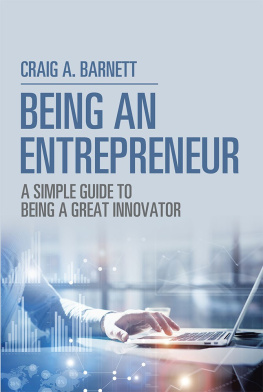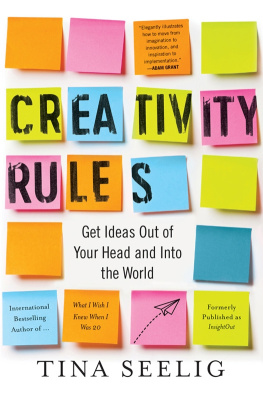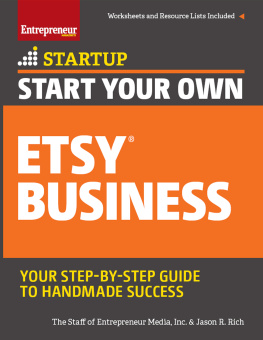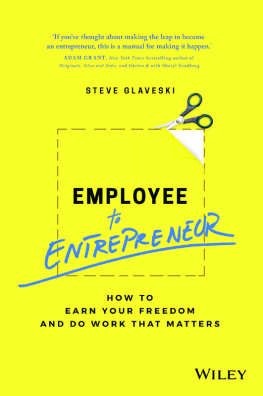BEING AN
ENTREPRENEUR
A SIMPLE GUIDE TO
BEING A GREAT INNOVATOR
CRAIG A. BARNETT

AuthorHouse
1663 Liberty Drive
Bloomington, IN 47403
www.authorhouse.com
Phone: 1 (800) 839-8640
2018 Craig A. Barnett. All rights reserved.
No part of this book may be reproduced, stored in a retrieval system, or transmitted by any means without the written permission of the author.
Published by AuthorHouse 01/08/2018
ISBN: 978-1-5246-9457-9 (sc)
ISBN: 978-1-5246-9455-5 (hc)
ISBN: 978-1-5246-9456-2 (e)
Library of Congress Control Number: 2017908561
Any people depicted in stock imagery provided by Thinkstock are models, and such images are being used for illustrative purposes only.
Certain stock imagery Thinkstock.
Because of the dynamic nature of the Internet, any web addresses or links contained in this book may have changed since publication and may no longer be valid. The views expressed in this work are solely those of the author and do not necessarily reflect the views of the publisher, and the publisher hereby disclaims any responsibility for them.
Contents
So, you woke up in the middle of the night or from a vivid daydream on the bus and realized that you have a great idea for a product. Dont be afraid. This book will give you the skills and tools to confidently convert your idea into reality!
Sometimes being unafraid is easier said than done. Indeed, the fear of failure is what keeps most entrepreneurs from achieving their goals and bringing their ideas to life. Some common things you will read or hear about successful entrepreneurs is that they acknowledged and were able to manage their fear of failure and use it to their advantage. Still, many fantastic ideas and inventions have never made it into mainstream markets because the inventors, or those around them, slowed down the process and kept things from moving forward.
In this book, I will refer to a project, meaning the full lifecycle of an original product or servicefrom idea to completion. Thinking about your idea as a project encourages you to set goals and keep a holistic view of your progress. It gives you the ability to set milestones and build a roadmap that includes the high-level tasks needed to complete the project. Here, for example, is a simple project timeline:
Month 1 to 3. Develop an idea.
Months 4 to 6. Research current viability and uses.
Months 7 to 8. Create a solid business plan.
Months 9 to 12. Convene a trusted group of consultants.
Months 13 to 15. Define the business tasks required.
Months 16 to 24. Execute your idea.
I will also highlight examples of the types of toxic individuals and elements in your environment that can influence the overall outcome. As your project moves through its lifecycle, these elements may produce an aura of fear that confuses the process and prevents the project from reaching its full potential. Always take full ownership of your ideas and projects, remain the sole final decision maker until the project becomes a product or service. The ultimate litmus test will come when you sell your creation to the broader community and the all-important and (sometimes) judgmental consumer.
First, lets discuss fear of failure. Everyone fails at something from time to time, and it is well documented that learning from ones mistakes establishes a stronger sense of stability and reality. It is easy for people to boast about success and talk at length about their own shortcomings and failures, especially if they have already experienced, and conquered, what you are about to go through. Sometimes failure doesnt have quite the same impact on newly energized entrepreneurs, because all we want to do is be successful. However, what we need to donow and not a moment lateris escape the strong inner desire to succeed.
Failure is an important part of progress because it teaches us what not to do next time and helps us build the methods we use to develop new ideas and kick-start projects. Entrepreneurs dislike failure but will eventually learn to accept it. Some will give up altogether, deciding that it is just too hard. But you should welcome failure as learning, not an excuse to escape from the powerful internal determination that will bring your ideas to life.
Timing is also important when you are seeking to bring a new product or service to the world. I have seen entrepreneurs who appear to be flogging a dead horse; somehow, they find a way to make it look like theres life in the old mustang yet. These people have spent too long on their ideas and possibly need to place them on the back burner. Try not to dedicate too many resources to an idea that doesnt have strong traction. Try to do this without listening to others who are critical of your project, and dont consider yourself succumbing to fear. At this point, simply accept that the idea needs to grow a little further. I will provide some techniques for how to do this later in this book.
Once you curb the fear of failure, you will find a new ability to nurture your ideas. When you understand and are aware of fear, it can no longer affect you or hold you back. Just acknowledge the fearthat it exists and is real. Then watch as it loses its influence over you during your entrepreneurial journey. Its liberating to willingly confront fear and use the experience to jump over hurdles. There will be many opportunities for you to turn back fear as you continue on your journey. It becomes easier over time.

Using your own intuition and the feedback from your trusted group of advisors, which you will identify shortly, you will see the potential of the opportunity, and maybe steps you had not taken into account will become clearer along the way. Once fear has been set aside, at least for the time being, you can identify credible roadblocks that might cause hiccups but wont cripple your idea. Always keep a positive frame of mind, remembering that you can slightly alter your ideas to bypass hurdles; this can give you a vision to completion. Although feedback is important, it will ultimately only highlight others opinions and may not be entirely accurate. Still, dont be afraid to ask for honest feedback at each and every step of the way. If people sense you cannot take constructive feedback well, they may hold back key information. The feedback you do receive may tell you whether you should fail fast or carry on. Failing fast means identifying that nothing is working as it should and stopping the project as quickly as possible, avoiding the loss of unnecessary funds and time. Despite all the feedback you receive and no matter how much information you obtain on the Internet or from any other informational reservoir, the buck stops with you!
Sit in a comfortable environment, and collate the information you have. Ensure all decisions are yours, not something conjured up by fear-mongers. As I mentioned earlier, its always rewarding to talk with successful people who describe how they almost failed but managed to push through by removing roadblocks one at a time, sharing their stories on a global scale. If you decide to close down your project, take comfort in the knowledge that you have learned from the experience, which will benefit your next idea and the idea after that.
Secondly, fear of moving ahead on an idea because of someone elses opinion should never slow down or influence completion of the project. Fear is the other persons responsibility, not yours, so do not entertain the concept of absorbing it on his or her behalf. There are enough challenges within your control on which to focus. A simple tool to use is a journal; update it regularly, maintain a running list of activities, and reflect on them. List the hurdles you overcame to get beyond the blocks, when fear was involved and when it wasnt, and document the outcomes. Achieve this, and you will be on your way from a new idea to project completion.
Next page







